Filters: Format: "application/pdf" School Or College: "S. J. Quinney College of Law" Collection: "ir_uspace"
| Creator | Title | Description | Subject | Date | ||
|---|---|---|---|---|---|---|
| 126 |
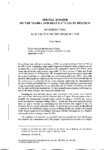 |
Mallat, Chibli | Special Dossier on the Sabra and Shatila Case in Belgium | This dossier collects key legal documents in the Sharon affair. Being a legal dossier, the collection contains two sets of documents. The first set traces the evolution of Belgium's 1993/1999 universal jurisdiction law by making available in English, in several cases for the first time, translati... | 2005 | |
| 127 |
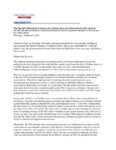 |
Mallat, Chibli | The Special Tribunal for Lebanon, the staring abyss and what must be done about it | The STL, the UN and Lebanon must all contribute to avert an explosive situation in the country | 2010-10-07 | |
| 128 |
 |
Firmage, Edwin B. | Speech and campaign reform: congress, the courts and community | Investigation following Watergate revealed the integrity of our political system to be threatened by corporate and other special interest money to a degree unmatched since the turn of the century, when the exploits of political boss Mark Hanna and the financial power of the corporations gave birt... | Public financing; Contributions; Corporate | 1980 |
| 129 |
 |
Flynn, John J. | Standard Oil and Microsoft - intriguing parallels or limping analogies? | The computer industry and the law of antitrust have been preoccupied with the struggle between the federal and several state governments and Microsoft for most of the past decade. Microsoft's use of its domination over the personal computer (PC) industry by virtue of its control of the operating sy... | 2002 | |
| 130 |
 |
Flynn, John J. | Survey of injunctive relief under state and federal antitrust laws | Relatively little has been written about equitable relief under state and federal antitrust laws.1 Equity power in antitrust enforcement means much more than the mere power to restrain a defendant from doing an act for which the plaintiff has no "remedy at law," to order a defendant to remove a nuis... | Statute; Directive | 1967 |
| 131 |
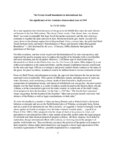 |
Mallat, Chibli | The Syrian-Israeli Boundaries in International Law: The Significance of the Armistice Demarcation Line of 1949 | Zero-sum equations have been the name of the game in the Middle East since the early Zionist settlements in the late 19th century. The classic Zionist motto, One dunum here, one dunum there has come to exemplify this logic for all the parties concerned, and the zero-sum logic continues to regulat... | 2000-07-13 | |
| 132 |
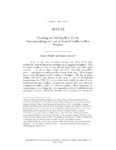 |
Guiora, Amos | Teaching an Old Dog New Tricks: Operationalizing the Law of Armed Conflict in New Warfare | Gone are the days of soldiers facing each other across large battlefields, tanks shelling tanks, and fighter jets engaging in dogfights. War, or armed conflict, to use a more precise legal term, now takes place everywhere in cities, refugee camps and other historically non-military areas and invol... | 2010-05-13 | |
| 133 |
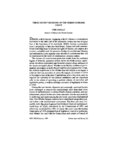 |
Mallat, Chibli | Three Recent Decisions of the Yemeni Supreme Court | Despite a rich history, beginning with the Ottoman constitutional movement in the latter part of the nineteenth century and that of Qajar Iran at the beginning of the twentieth, Middle Eastern constitutions have a propensity to turn into dead letters. Unless and until constitu- tional watchdogs begi... | 1995 | |
| 134 |
 |
Francis, Leslie | Title IX: equality for women's sports? | Since their beginnings in 1859 with a crew race between Harvard and Yale, intercollegiate athletics have been central to the mythology of American universities. Varsity football dominates the fall social calendar of student life; "homecoming," timed to coincide with an important football game, evok... | 1995 | |
| 135 |
 |
Firmage, Edwin B. | Treaty on the nonproliferation of nuclear weapons | THE NEED : On March 13, 1969, the United States Senate by a vote of 83 to 15 consented to the ratification of a treaty described as "the most important international agreement brought before the U. S. Senate since the North Atlantic Pact" and "the most important international agreement limiting nucl... | Arms control; Diffusion of arms; Atomic negotiations | 1969-10 |
| 136 |
 |
Flynn, John J. | Trends in federal antitrust doctrine suggesting future directions for state antitrust enforcement | State antitrust policy, in the form of constitutional provisions, statutes, and common law decisions, has been with us for decades.1 Originally hamstrung by restrictive court decisions fencing off state jurisdiction from commerce that was "interstate,"2 state antitrust enforcement enjoyed many years... | Antitrust enforcement | 1979 |
| 137 |
 |
Flynn, John J. | Tribute: Daniel J. Dykstra: the Utah Years 1949-1965 | It is with humility and trepidation that I rise to recount Dan Dykstra's years as a teacher, leader, and friend of the University of Utah, its College of Law, his Utah colleagues, and his Utah students. Humility because there are those with us today who are better able to recall those years like his... | Memorial service; Essay; Law, faculty | 2000 |
| 138 |
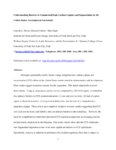 |
Davies, Lincoln L. | Understanding Barriers to Commercial-Scale Carbon Capture and Sequestration in the United States: An Empirical Assessment | Although a potentially useful climate change mitigation tool, carbon capture and sequestration (CCS) efforts in the United States remain mired in demonstration and development. Prior studies suggest numerous reasons for this stagnation. This article empirically assesses those claims. Using an anonym... | 2013-08 | |
| 139 |
 |
Flynn, John J. | University and human values: introspection | It is reported that Socrates, the patron saint of law professors and many other teachers, was convicted and sentenced to death by the people of Athens on a three-count indictment: for refusing to recognize the gods recognized by the state, for introducing other and new divinities, and for "corrupti... | 1984 | |
| 140 |
 |
Firmage, Edwin B. | Utah Supreme Court and the rule of law: Phillips and the Bill of Rights in Utah | The Utah Supreme Court in State v. Phillips denied the applicability of the freedom of speech provisions of the fist amendment (and by dicta any other provision of the Bill of Rights) as a protection of individual rights against state governments by way of the due process clause of the fourteenth am... | Utah Law; Utah Supreme Court; Free speech | 1975 |
| 141 |
 |
Firmage, Edwin B. | Violence and the gospel: the teachings of the Old Testament, the New Testament, and the Book of Mormon | A United Nations study estimates that the direct effects of an all-out nuclear exchange-the initial blasts, the consequent radiation, and the ensuing fires-would kill 1.1 billion people.1 Beyond those direct effects, indirect, radiation-related effects would create an unprecedented pandemic that wo... | Warfare; War; Deliverance | 1986 |
| 142 |
 |
Firmage, Edwin B. | Vladivostok and beyond: SALT I and the propects for SALT II | The tortuously constricted boundaries within which the Vladivostok agreement can be considered as an advance toward the goal of arms reduction and stability remind us once again that technology unconstrained by law inexorably limits that arena within which we enjoy the capacity to control our own f... | Arms control; SALT I; SALT II; Atomic negotiations | 1975 |
| 143 |
 |
Firmage, Edwin B. | War power of Congress and revision of the war powers resolution | The United States Congress enacted the War Powers Resolution to restore its constitutionally mandated control over the war- making process. By forcing the President to seek congressional approval for military activity in volatile situations, Congress hoped to avoid the abuse of the war power by the ... | Control; Delegation; Self-defense | 1991 |
| 144 |
 |
Firmage, Edwin B. | War powers and the political question doctrine | A fundamental and potentially healthy tension exists between democratic government, under which the majority ordinarily prevails, and judicial review, by which the judiciary may check unconstitutional actions of the political branches. A balance must be struck between the two concepts, or one could ... | Democratic; Federalism; Judicial | 1977 |
| 145 |
 |
Flynn, John J. | Which past is prolog? the future of private antitrust enforcement | For the past four decades, and despite doubts voiced 100 years ago by the principal draftsmen of the Sherman Act,' the primary enforcement of the federal antitrust laws has occurred through private litigation.2 | 1990 | |
| 146 |
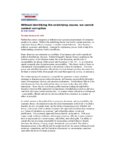 |
Chodosh, Hiram | Without identifying the underlying causes, we cannot combat corruption | Without the underlying factors that lead to corrupt practices, we cannot develop an effective strategy to combat corrupt behavior | 2009-11-05 |
